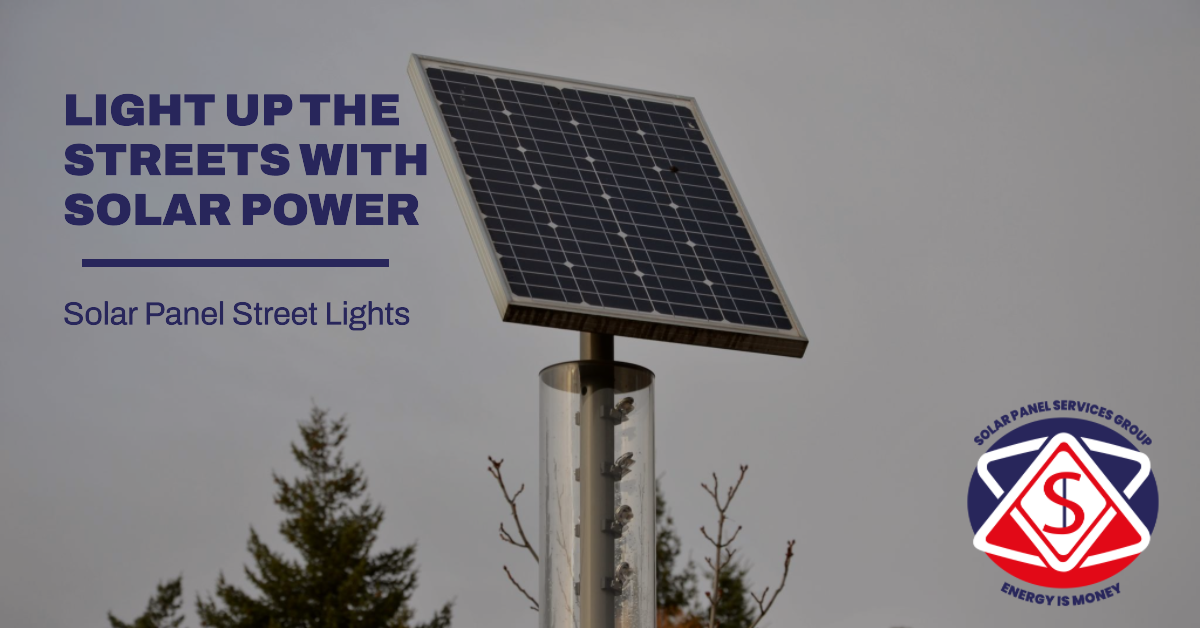
Solar Panel Street Lights | Solar Panel Service Group
In today’s ever-evolving world, the quest for sustainability has become a paramount concern. As we grapple with the consequences of climate change and dwindling natural resources, innovation in renewable energy sources is crucial.
One such innovation that has been making significant strides in the field of urban lighting is solar panel street lights. In this comprehensive article, we will delve into the world of solar panel street lights, exploring their technology, benefits, installation, and environmental impact.
Solar panel street lights are a groundbreaking solution to the increasing demand for energy-efficient and eco-friendly urban lighting. Powered by the sun’s abundant energy, these lights offer a sustainable alternative to traditional street lighting systems that rely on fossil fuels. Let’s explore the inner workings of these illuminating marvels.
How Solar Panel Street Lights Work?
At the core of solar panel street lights is photovoltaic technology. Solar panels, typically mounted on top of the streetlight pole, capture sunlight and convert it into electricity through the photovoltaic effect. This electricity is stored in batteries, ensuring a constant power supply, even during nighttime.
Advantages of Solar Panel Street Lights
Cost-Efficiency
One of the primary benefits of solar panel street lights is their cost-efficiency. While the initial installation cost may be higher than traditional streetlights, the long-term savings in energy bills outweigh this expense.
Environmentally Friendly
Solar panel street lights are environmentally friendly, emitting no greenhouse gases and reducing carbon footprints. They contribute significantly to a cleaner and greener urban environment.
Low Maintenance
With minimal moving parts, solar panel street lights require little maintenance. This is a boon for local authorities and municipalities, saving them both time and money.
Components of a Solar Panel Street Light
Solar Panels
Solar panels are the heart of the system. They capture sunlight and convert it into electricity, ensuring a consistent power supply.
LED Lights
Light Emitting Diode (LED) lights are energy-efficient and provide bright, long-lasting illumination.
Batteries
Batteries store excess energy generated during the day, ensuring continuous operation during the night.
Installation Process
Installing solar panel street lights involves securing the pole, mounting the solar panels and LED lights, and connecting the batteries. Proper installation is critical for optimal performance.
Key Considerations for Installation
Factors such as location, sunlight exposure, and local weather conditions must be considered when installing solar panel street lights to maximize their efficiency.
Maintenance and Troubleshooting
Regular inspections and maintenance ensure the smooth operation of solar panel street lights. Troubleshooting may be required in case of technical issues.
Environmental Impact
Solar panel street lights play a pivotal role in reducing the environmental impact of urban areas. They decrease reliance on non-renewable energy sources and lower light pollution.
Solar Panel Street Lights Worldwide
These lights have gained popularity worldwide, illuminating streets in cities from New York to Nairobi. Their adoption is on the rise as more communities embrace sustainable lighting solutions.
Future Innovations
Researchers continue to work on improving the efficiency and cost-effectiveness of solar panel street lights. Innovations like integrated sensors for smart lighting and enhanced battery technology are on the horizon.
Challenges and Limitations
Despite their numerous advantages, solar panel street lights face challenges such as high upfront costs and variability in energy production due to weather conditions.
Solar Panel Street Lights vs. Traditional Street Lights
Comparing solar panel street lights with their conventional counterparts highlights the superiority of the former in terms of sustainability, cost savings, and environmental impact.
Case Studies
Examining real-world examples of solar panel street light installations showcases their success stories and positive impact on communities.
Government Incentives and Policies
Government initiatives and incentives play a significant role in promoting the adoption of solar panel street lights. Understanding these policies can aid in their implementation.
Final Thoughts
Solar panel street lights represent a significant leap towards sustainable urban lighting. Their cost-efficiency, environmental benefits, and low maintenance make them a compelling choice for cities aiming to reduce their carbon footprint. As we move towards a cleaner and greener future, solar panel street lights are a beacon of hope, lighting the way for a brighter and more sustainable tomorrow.
FAQs
Q1. Are solar panel street lights suitable for all climates?
- Yes, solar panel street lights can be adapted to different climates, but their efficiency may vary depending on the amount of sunlight the area receives.
Q2. How long do the batteries in solar panel street lights last?
- The lifespan of batteries in solar panel street lights typically ranges from 3 to 5 years, but this can vary based on the quality of the batteries and usage.
Q3. Can solar panel street lights be retrofitted to existing streetlight poles?
- Yes, in many cases, existing streetlight poles can be retrofitted with solar panels and LED lights to make them more energy-efficient.
Q4. Do solar panel street lights require regular cleaning of the panels?
- Yes, periodic cleaning of solar panels is recommended to maintain their efficiency. Dust and debris can accumulate over time and reduce their effectiveness.
Q5. Are there any government incentives for installing solar panel street lights?
A. Many governments offer incentives, grants, or tax credits for the installation of solar panel street lights as part of their sustainability initiatives. Be sure to check with your local authorities for specific programs available in your area.




